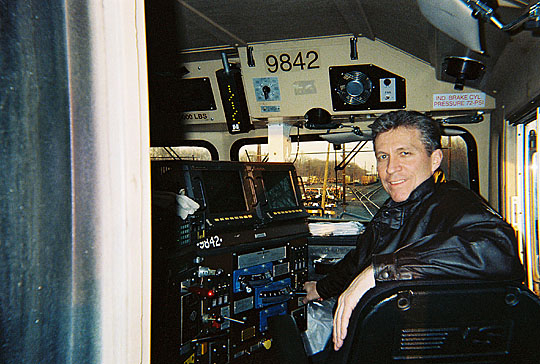Not ‘Too Dumb to Vote’: Railroad Workers Block Plan to End Rank-and-File Voting for Officers

At the BLET convention in Reno this week, the old guard in the Brotherhood of Locomotive Engineers and Trainmen wanted to block rank and filers' right to vote for top officers, but withdrew the last-gasp effort in the face of unified opposition.
Railroad engineers had resoundingly told their national leaders August 30 they’re not “too dumb to vote,” casting ballots 6,305 to 2,452 in a national referendum to keep the right to vote for top officers.
Rank and filers will exercise that vote for the first time in November when reformer Tom Brennan, an engineer from Philadelphia, squares off against incumbent Dennis Pierce. In the last presidential election, in 2006, Brennan garnered 40 percent of convention delegates’ votes.
Since 2006 three of the BLET’s top officers, including two presidents, have left in disgrace because of graft. One, Ed Rodzwicz, was just sentenced to jail time for requesting a $20,000 bribe from an attorney. Another was removed for spending tens of thousands of dollars of union money on basketball tickets and trips.
A third president “was barely in office and retired or he would have been indicted,” said Hugh Sawyer, president of an Atlanta local (which are called “divisions” in the BLET). “We’re on our fourth president since 2006.”
It was Sawyer’s division that spearheaded the effort in 2006 to hold a referendum on switching to a rank-and-file vote for officers. It won, over Pierce’s and other leaders’ objections, by 62 percent. But as the date for the first vote approached, leaders panicked. The home divisions of Pierce and his vice president initiated a drive to take away members’ right to vote—the effort that was emphatically rejected last month.
“I’m surprised they found 2,400 people to vote for that,” Sawyer said. “Members were offended, as well they should be. One of our flyers said, ‘Are you too dumb to vote?’”
With the help of Teamsters for a Democratic Union, members initiated a group called BLET Members for Democracy, started distributing flyers, and worked the internet. Proponents of rescinding the right to vote had argued that members were too disengaged from the union to make decisions.
Ron Kaminkow, an Amtrak engineer in Reno, Nevada, says member dissatisfaction has made the November election Brennan’s to lose. He’s confident members will “throw out the old guard good-old-boy network and take advantage of this opportunity to confront the carriers head on.” Kaminkow is a leader of Railroad Workers United, a group that works for cross-craft solidarity among the many rail unions.
THE SMELL OF AN ENGINE

SUPPORT LABOR NOTES
BECOME A MONTHLY DONOR
Give $10 a month or more and get our "Fight the Boss, Build the Union" T-shirt.
Brennan started out as an engineer, became a lawyer, and worked on the International staff for eight years, but resigned because of the “culture of entitlement” he saw there, where officers were decades past “smelling the inside of an engine.” In negotiations with the carriers, he said, “if you closed your eyes you would think everybody in the room was management.”
Brennan says he wants the carriers and government regulators to respect the BLET on the train and at the bargaining table. A big goal is pay that matches engineers’ level of responsibility and compensates them for highly irregular hours, constantly being on call, with the accompanying intrusion into personal life.
In the 1970s and 1980s the BLET underwent a decade and a half of concessionary bargaining, he says, but when the industry turned around and started to boom through the 1990s and today, management didn’t share.
“Transportation has not been subject to the new world order,” Sawyer points out, noting that trucking, railroad, and barge jobs can’t be moved overseas. “When our wages are not keeping up with inflation, when we’re absorbing the health care cost increases, we’re giving back when we don’t have to give back.”
POKE ’EM IN THE EYE
Brennan says employers are gunning to make train-driving a “throwaway job,” with high turnover not seen in the past. A hundred might come to a hiring session, five are hired, only two will stick. Although experienced engineers who are constantly on call can make $90,000 a year, starting pay is as low as $17 an hour, and employers are always hiring.
Brennan also criticizes the union’s lackluster performance on heading off one-person operation—getting rid of conductors—and on operating trains by remote control. He sees officers far too willing to give in to the carriers’ demands. “You’ve got to be willing to poke your finger in their eye,” he says.
Turnouts are usually low in the 37,000-member BLET, though half the members came out to approve merger with the Teamsters in 2003. The BLET has maintained virtually all its autonomy in that marriage, but is subject to the same federal oversight of elections as the parent union.
As Brennan campaigns—mostly online in the hours before he goes to work on the Norfolk Southern—he is trying for a big turnout, which he says would mean “people are looking for hope, looking for change.”





